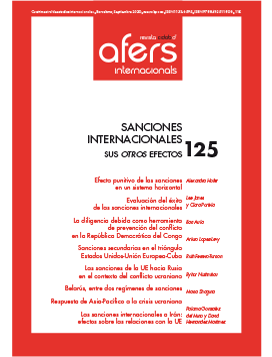Evaluating the success of international sanctions: a new research agenda
Keywords:
international sanctions, methodology, evaluation, compliance, efficacyAbstract
Revista CIDOB d’Afers Internacionals, nº 125
Quadrimestral (May-September 2020)
ISSN:1133-6595 | E-ISSN:2013-035X
DOI: doi.org/10.24241/rcai.2020.125.2.39
Sanctions scholarship generally considers sanctions to be “successful” when targets comply with sender’ demands. This form of evaluation is inadequate. Firstly, without a robust methodology it is hard to determine whether sanctions produce compliance. Secondly, sanctions tend to pursue goals beyond those announced, which may relate to the target, the sender itself or the international system. An evaluation of the effectiveness of sanctions must identify all these goals, recognise their interrelations and measure their success with the help of interpretative methods.
>> The full text articles are available in Spanish language
References
Aljazeera. «Removing Saddam strengthened Iran». Aljazeera, (5 de septiembre de 2006) (en línea) [Fecha de consulta: 21.04.2020]
https://www.aljazeera.com/archive/2006/09/200849131514551633.html
Baldwin, David. Economic Statecraft. Princeton: Princeton University Press, 1985.
Baldwin, David; Pape, Robert. «Evaluating Economic Sanctions». International Security, vol. 23, n.° 2 (1998), p. 189-198.
Baldwin, David. «The Sanctions Debate and the Logic of Choice». International Security, vol. 24, n.° 3 (2000), p. 80-107.
Barber, James. «Economic Sanctions as a Policy Instrument». International Affairs, vol. 55, n.° 3 (1979), p. 367-384.
Bergeijk, Peter van. «The Impact of Economic Sanctions in the 1990s». World Economy, vol. 18, n.° 3 (1995), p. 443-455.
Biersteker, Thomas; Eckert, Sue y Tourinho, Marcos (eds.). Targeted Sanctions: The ffectiveness of UN Action. Cambridge: Cambridge University Press, 2016.
Blanchard, Jean-Marc y Ripsman, Norrin. «Asking the Right Question: When do Economic Sanctions Work Best?», Security Studies, vol. 9, n.° 1 (1999), p.219-253.
Blanchard, Jean-Marc y Ripsman, Norrin. «A Political Theory of Economic Statecraft». Foreign Policy Analysis, vol. 4, n.° 4 (2008), p. 371-398.
Borzyskowski, Inken von y Portela, Clara. «Sanctions Cooperation and Regional organisations». En: Aris, Stephen; Snetkov, Aglaya y Wenger, Andreas (eds.). Inter-organisational Relations in International Security: Cooperation and Competition. Abingdon: Routledge, 2018, p. 240-261.
Brooks, Risa. «Sanctions and Regime Type: What Works and When?». Security Studies, vol. 11, n.° 4 (2002), p. 1-50.
Brzoska, Michael. «Research on the Effectiveness of International Sanctions». En: Hegemann, Hendrik; Heller, Regina y Kahl, Martin (eds.). Studying ‘Effectiveness’ in International Relations. Opladen: Budrich, 2013, p. 143-160.
Chesterman, Simon y Pouligny, Beatrice. «Are Sanctions Meant to Work? The Politics of Creating and Implementing Sanctions through the United Nations». Global Governance, vol. 9, n.° 4 (2003), p. 503-518.
Christensen, Thomas J. Useful Adversaries: Grand Strategy, Domestic Mobilization, and Sino-American Conflict, 1947-1958. Princeton: Princeton University Press, 1996.
Cortright, David y Lopez, George. The Sanctions Decade: Assessing UN Strategies in the 1990s. Boulder: Lynne Rienner, 2000.
Crawford, Neta y Klotz, Audrey (eds.). How Sanctions Work: Lessons from South Africa. Nueva York: St. Martin’s, 1999.
Dashti-Gibson, Jaleh; Davis, Patricia y Radcliff, Benjamin. «On the Determinants of the Success of Economic Sanctions: An Empirical Analysis». American Journal of Political Science, vol. 41, n.° 2 (1997), p. 606-618.
Derrida, Jacques. «Autoimmunity: Real and Symbolic Suicides - A Dialogue with Jacques Derrida». En: Borradori, Giovanna (ed.). Philosophy in a Time of Terror: Dialogues with Jürgen Habermas and Jacques Derrida. Chicago: University of Chicago Press, 2003, p. 85-136.
Doxey, Margaret. Economic Sanctions and International Enforcement. Londres:
Macmillan, 1980.
Doxey, Margaret. «Sanctions through the Looking Glass: The Spectrum of Goals and Achievements». International Journal, vol. 55, n.° 2 (2000), p. 207-223.
Doxey, Margaret. «Reflections on the Sanctions Decade and Beyond». International Journal, vol. 64, n.° 2 (2009), p. 539-549.
Drezner, Daniel W. The Sanctions Paradox: Economic Statecraft and International Relations. Nueva York: Cambridge University Press, 1999.
Drolet, Jean-Francois. «The Visible Hand of Neo-Conservative Capitalism». Millennium, vol. 35, n.° 2 (2007), p. 245-278.
Drury, Cooper. «Revisiting Economic Sanctions Reconsidered». Journal of Peace Research, vol. 35, n.° 4 (1998), p. 497-509.
Drury, Cooper. «How and Whom the US President Sanctions: A Time-Series Cross-Section Analysis of US Sanction Decisions and Characteristics». En: Chan, Stephen y Drury, Cooper (eds.). Sanctions as Economic Statecraft: Theory and Practice. Londres: Macmillan, 2000, p. 17-36.
Drury, Cooper. «Sanctions as Coercive Diplomacy: The U.S. President’s Decision to Initiate Economic Sanctions». Political Research Quarterly, vol. 54, n.° 3 (2001), p. 485-508.
Elliott, Kimberly A. y Uimonen, Peter. «The Effectiveness of Economic Sanctions with Application to the Case of Iraq». Japan and the World Economy, vol. 5, n.° 4 (1993), p. 403-409.
Elliott, Kimberly A. «Factors Affecting the Success of Sanctions». En: Cortright, David y Lopez, George (eds.). Economic Sanctions. Panacea or Peacebuilding in a Post-Cold War World? Boulder: Westview Press, 1995, p. 51-59.
Elliott, Kimberly A. «The Sanctions Glass: Half Full or Completely Empty?», International Security, vol. 23, n.° 1 (1998), p. 50-65.
Elliott, Kimberly A. «Assessing UN Sanctions After the Cold War». International Journal, vol. 65, n.° 1 (2010), p. 86-97.
Escribà-Folch, Abel. «Authoritarian Responses to Foreign Pressure: Spending, Repression, and Sanctions». Comparative Political Studies, vol. 45, n.° 6 (2012), p. 683-713.
Farrell, Henry y Newman, Abraham. «Weaponized Interdependence: How Global Economic Networks Shape State Coercion». International Security, vol. 44, n.° 1 (2019), p. 42-79.
Fayazmanesh, Sasan. «The Politics of the US Economic Sanctions against Iran». Review of Radical Political Economics, vol. 35, n.° 3 (2003), p. 221-240.
Fisk, Daniel W. «Economic Sanctions: The Cuba Embargo Revisited». En: Chan, Stephen y Drury, Cooper (eds.). Sanctions as Economic Statecraft: Theory and Practice. Londres: Macmillan, 2000, p. 65-85.
Galtung, Johann. «On the Effects of International Economic Sanctions, with Examples from the Case of Rhodesia». World Politics, vol. 19, n.° 3 (1967), p. 378-416.
Giumelli, Francesco. «The Purposes of Sanctions». En: Biersteker, Thomas; Eckert, Sue y Tourinho, Marcos (eds.). Targeted Sanctions. The Effectiveness of UN Action. Cambridge: Cambridge University Press, 2016, p. 38-59.
Gordon, Joy. Invisible War: The United States and the Iraq Sanctions. Cambridge, MA: Harvard University Press, 2010.
Gould-Davies, Nigel. «Russia, the West and Sanctions». Survival, vol. 62, n.° 1 (2020), p. 7-28.
Haas, Richard N. «Sanctioning Madness». Foreign Affairs, vol. 76, n.° 6 (1997), p. 74-85.
Halliday, Fred. Rethinking International Relations. Londres: Macmillan, 1994.
Hellquist, Elin. «Either With us or Against us? Third-Country Alignment with EU Sanctions against Russia/Ukraine». Cambridge Review of International Affairs, vol. 29, n.° 3 (2016), p. 997-1.021.
Helms, Jesse. «What Sanctions Epidemic? US Business’ Curious Crusade». Foreign Affairs, vol. 78, n.° 1 (1999), p. 2-8.
Hoffmann, Fredrik. «The Functions of Economic Sanctions: A Comparative Analysis», Journal of Peace Research vol. 4, n.° 2 (1967), p. 140-159
Hufbauer, Gary C.; Jeffrey Schott y Elliott, Kimberly. Economic Sanctions Reconsidered: History and Current Policy. Washington, DC: Petersen Institute for International Economics, 1985.
Hurd, Ian. «The Strategic Use of Liberal Internationalism: Libya and the UN Sanctions, 1992-2003». International Organization, vol. 59, n.° 2 (2005), p. 495-526.
Jones, Catherine. «Sanctions as Tools to Signal, Constrain, and Coerce». Asia Policy, vol. 13, n.° 3 (2018), p. 20-27.
Jones, Lee. Societies under Siege: Exploring How International Economic Sanctions (Do Not) Work. Oxford: Oxford University Press, 2015.
Kaempfner, William y Lowenberg, Anton. International Economic Sanctions: A Public Choice Approach. Oxford: Westview Press, 1992.
Kirshner, Jonathan. «The Microfoundations of Economic Sanctions». Security Studies, vol. 6, n.° 3 (1997), p. 32-64.
Kirshner, Jonathan. «Economic Sanctions: The State of the Art». Security Studies, vol. 11, n.° 4 (2002), p. 160-179.
Kluge, Janis. «Taking Stock of US Sanctions on Russia». Foreign Policy Research Institute, (14 de enero de 2019) (en línea) [Fecha de consulta: 24.04.2020]
https://www.fpri.org/article/2019/01/taking-stock-of-u-s-sanctions-on-russia/
Lake, Anthony. «Confronting Backlash States». Foreign Affairs vol. 73, n.° 2 (1994), p. 45-55.
Lektzian, David y Souva, Mark. «An Institutional Theory of Sanctions Onset and Success». Journal of Conflict Resolution, vol. 51, n.° 6 (2007), p. 848-871.
Lindsay, James M. «Trade Sanctions as Policy Instruments: A Re-examination». International Studies Quarterly, vol. 30, n.° 2 (1986), p. 153-173.
Lopez, George y Cortright, David. «Containing Iraq: Sanctions Worked». Foreign Affairs, vol. 83, n.° 4 (2004), p. 90-103.
Mack, Andrew y Kahn, Asif. «The Efficacy of UN Sanctions». Security Dialogue, vol. 31, n.° 3 (2000), p. 279-792.
Mallard, Gregoire. «Governing Proliferation Finance: Multilateralism, Transgovernmentalism, and Hegemony in the Case of Sanctions against Iran». En: Brousseau, Eric; Glachant, Jean-Michel y Sgard, Jerome (eds.). The Oxford Handbook of Institutions of International Economic Governance and Market Regulation. Oxford: Oxford University Press, 2019, p. 1-21.
McGillivray, Fiona y Smith, Alistair. «Credibility in Compliance and Punishment: Leader Specific Punishments and Credibility». Journal of Politics, vol. 68, n.° 2 (2006), p. 248-258.
Mercille, Julien y Jones, Alun. «Practicing Radical Geopolitics: Logics of Power and the Iranian Nuclear ‘Crisis’». Annals of the Association of American Geographers, vol. 99, n.° 5 (2009), p. 856-862.
Miller, Nicholas L. «The Secret Success of Non-Proliferation Sanctions». International Organization, vol. 68, n.° 4 (2014), p. 913-944.
Nooruddin, Irfan. «Modelling Selection Bias in Studies of Sanctions Efficacy». International Interactions, vol. 28, n.° 1 (2002), p. 59-75.
Nossal, Kim. «International Sanctions as International Punishment». International Organization, vol. 43, n.° 2 (1989), p. 301-322.
Pape, Robert. «Why Economic Sanctions do not Work». International Security, vol. 22, n.° 2 (1997), p. 90-136.
Pape, Robert. «Why Economic Sanctions Still do not Work». International Security, vol. 23, n.° 1 (1998), p. 66-77.
Peksen, Dursun. «When Do Imposed Economic Sanctions Work? A Critical Review of the Sanctions Effectiveness Literature». Defence and Peace Economics, vol. 30, n.° 6. (2019), p. 634-647.
Portela, Clara. European Union Sanctions and Foreign Policy. Londres: Routledge, 2010.
Pospieszna, Paulina; Skrzypczyńska, Joanna y Stępień, Beata. «Hitting Two Birds with One Stone: How Russian Countersanctions Intertwined Political and Economic Goals». Political Science & Politics, vol. 53, n.° 2 (2020), p. 243-247.
Preeg, Ernest H. Feeling Good or Doing Good with Sanctions: Unilateral Economic Sanctions and the U.S. National Interest. Washington, DC: CSIS Press, 1999.
Rosenberg, Justin. The Empire of Civil Society: A Critique of the Realist Theory of International Relations. Londres: Verso, 1994.
Rowe, David M. Manipulating the Market: Understanding Economic Sanctions, Institutional Change, and the Political Unity of White Rhodesia. Ann Arbor: University of Michigan Press, 2001.
Shambaugh, George. States, Firms, and Power: Successful Sanctions in United States Foreign Policy. Albany: State University of New York Press, 1999.
Tang, Shiping. «Reputation, Cult of Reputation, and International Conflict». Security Studies, vol. 14, n.° 1 (2005), p. 34-62.
Taylor, Brendan. Sanctions as Grand Strategy. Londres: IISS, 2010.
Thinan, Myo Nyun. «Feeling Good or Doing Good: Inefficacy of the US Unilateral Sanctions against the Military Government of Burma/Myanmar». Washington University Global Studies Law Review vol. 7, n.° 3 (2008), p. 455-518.
Tsebelis, George. «Are Sanctions Effective? A Game Theoretical Analysis». Journal of Conflict Resolution, vol. 34, n.° 1 (1990), p. 3-28.
US Government. «Burmese Freedom and Democracy Act of 2003». Congress. gov, Public Law 108-161, (28 de julio de 2003) (en línea) https://www.congress.gov/108/plaws/publ61/PLAW-108publ61.pdf
Wilson, Peter y Yao, Joanne. «International sanctions as a primary institution of International Society». En: Brems Knudsen, Tonny y Navari, Cornelia (eds.).
International Organization in the Anarchical Society. Cham: Palgrave Macmillan, 2018, p. 127-148.













